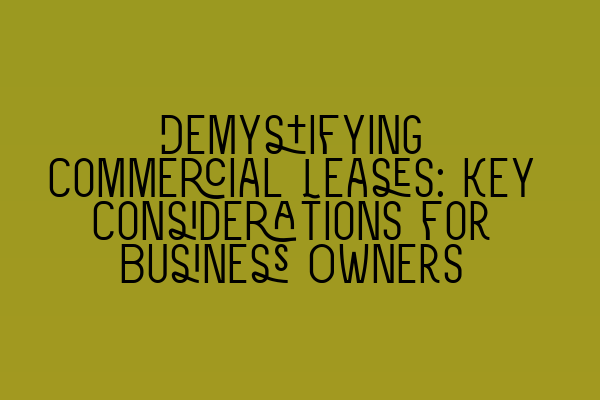Demystifying Commercial Leases: Key Considerations for Business Owners
Welcome to the SQE Property Law & Land Law blog! In this article, we will delve into the world of commercial leases and explore the key considerations business owners should keep in mind when entering into such agreements. Commercial leases can be complex, so it’s crucial to have a solid understanding of the important factors that can significantly impact your business’s success.
What is a Commercial Lease?
A commercial lease is a legally binding agreement between a landlord and a business owner that allows the business owner to occupy and use a property for commercial purposes. Unlike residential leases, commercial leases often come with more complexities, as they involve a variety of factors which should be carefully evaluated before signing any contract.
Length of Lease
The length of a commercial lease is a critical consideration for both landlords and tenants. It is important to determine the duration of the lease that aligns with your business goals and objectives. Longer leases provide stability and reduce the risk of relocation, while shorter leases offer flexibility to adapt to changing business needs. It is essential to carefully negotiate the lease term to ensure it suits your long-term plans.
Types of Leases
There are several types of commercial leases, each offering different advantages and disadvantages:
- Full-Service Lease: This type of lease includes rent and all operating expenses, including utilities, maintenance, and property taxes. It offers convenience but may have a higher base rent.
- Net Lease: In a net lease, the tenant pays rent along with a share of the property’s operating expenses. It offers more control over expenses but requires additional management.
- Gross Lease: In a gross lease, the tenant pays a fixed rent, while the landlord is responsible for all operating expenses. It provides simplicity but may result in higher overall costs.
Consideration of Rent
When negotiating a commercial lease, both landlords and tenants must carefully consider the rent structure. Rent is a significant expense for businesses, and understanding the components of rent can help manage costs effectively. It is important to have clarity on factors such as rent increases, rent review processes, and any additional charges such as service charges or insurance costs.
Use Class
The use class of a commercial property determines the permitted use of the space. It is crucial to ensure that the property is suitable for your business activities and falls within the correct use class. Making a mistake in this area can lead to legal complications and potential restrictions on your business operations. Seek professional advice to understand the use class requirements and any potential restrictions.
Repairs and Maintenance
The responsibility for repairs and maintenance should be clearly outlined in the lease agreement. Understanding your obligations as a tenant and the landlord’s responsibilities can prevent disputes and unexpected costs down the line. Conduct a thorough inspection of the property before signing the lease and document any existing issues to avoid any disputes later.
Break Clauses
A break clause allows either the landlord or tenant to terminate the lease before the end of the agreed term. Break clauses provide flexibility and an opportunity to exit the lease prematurely if necessary. Understanding the conditions and implications of the break clause is crucial to avoid potential penalties or disputes.
Seek Professional Guidance
Commercial leases are legally binding contracts that require careful consideration and expert guidance. It is highly recommended to consult with a solicitor specialized in property law to provide guidance and ensure your interests are protected. At SQE Property Law & Land Law, our experienced team can assist you in all aspects of commercial lease negotiations and help you make informed decisions.
For more information on related topics, please check out our articles:
- Misrepresentation in Contracts: Unveiling Deceptive Practices
- A Closer Look at SQE Contract Law Syllabus
- SQE Contract Law: Analyzing Landmark Cases and Influential Judicial Decisions
- Contract Law for Services: Key Considerations and Best Practices
- Understanding Contractual Capacity: Rights and Limitations
